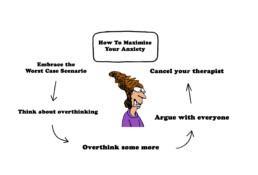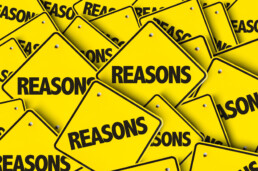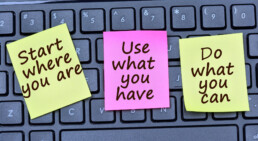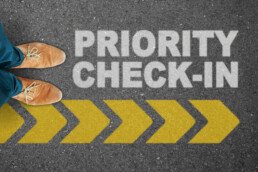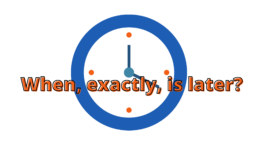Tips for people who do or may have ADHD
There are some common “problems” linked to ADHD. However, you can also associate many of these issues with youth, old age, lack of sleep, boredom, lack of interest, anger, excitement, a full schedule, or just a lack of organization. Regardless of the cause, here are some good ways to manage:
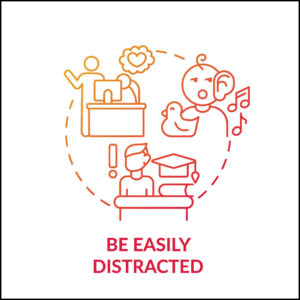 Easily distracted? With each action that calls to you, ask “What is my goal?” If the “distraction” is more relevant than your current action, then decide how you want to follow through with that activity.
Easily distracted? With each action that calls to you, ask “What is my goal?” If the “distraction” is more relevant than your current action, then decide how you want to follow through with that activity.
Interest difficulty? I bet you’re really good at being involved with things you find interesting. Telling yourself something is boring or difficult does not make things better. Instead, look for a way to include one of your values in the activity.
Impulsivity leading to mistakes? Breathe. Research, re-read, and respond instead of just blindly reacting.
Brain pauses? You’re on your way out the door and suddenly remember you haven’t returned a phone call. Time will march on and make you late if you stop and make the call. Write a quick note to yourself and make the call after your current action.
Misplaced items? Think about creating permanent “homes” for things, and make sure to return those things to their homes.
Late assignments? Yes, you need to know when something is due. And, setting start dates for each step can prevent the mad panic of just thinking about a due date.
Procrastinate much? Use the 30 second rule. If something can be done in 30 seconds or less, just do it.
- Sydney Metrick
The Door to Change
“No one can persuade another to change. Each of us guards a gate of change that can only be opened from the inside. We cannot open the gate of another, either by argument or emotional appeal.” (Marilyn Ferguson)
I’d add, nor by teaching or coaching. People don’t change just because it’s a good idea. Change takes commitment and perseverance. I’m guessing you have some behaviors you’d like to change. The thing is, your behaviors are either long-standing habits or they are expressions of a condition like ADHD, and both take a great deal of commitment and perseverance to change.
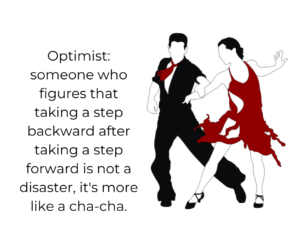 In the book, Mastery, George Leonard says, “learning any new skill involves relatively brief spurts of progress, each of which is followed by a slight decline to a plateau somewhat higher in most cases than that which preceded it.” That’s the fancy way of saying it’s a “two steps forward, one step back” kind of thing.
In the book, Mastery, George Leonard says, “learning any new skill involves relatively brief spurts of progress, each of which is followed by a slight decline to a plateau somewhat higher in most cases than that which preceded it.” That’s the fancy way of saying it’s a “two steps forward, one step back” kind of thing.
Discouragement is likely when change is difficult to notice. It’s easy to drop out at the plateaus. The good news is that our brains have a quality of plasticity. By persisting in developing a new behavior your brain will gradually change and the “new behavior” will become “the standard behavior” in time.
-Sydney Metrick
Whose Story Are You In?
It’s easy to say “be yourself,” but quite another thing to know who you truly are. You may use your name, relationship status, career, ethnicity…or you may break down the description into behaviors. We all have many stories we use to define ourselves.
People I coach often say “I’m a person who—
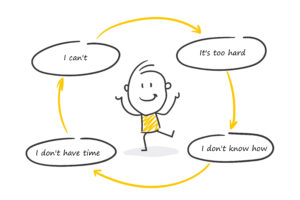 is always late
is always late- is disorganized
- can’t catch up
- procrastinates
- has a million projects and never finish any
- can’t ever find my keys
You get the drift.
It's important to become aware of the story you tell about yourself. As Henry Ford said, “Whether you think you can, or you think you can't--you're right.” So, if you’re caught in the vicious circle of “I can’t,” “it’s too hard,” “I don’t have time,” and so on; is that really the story you want to define you?
 I read about a “virtuous circle,” in which you focus on the positive and change to a self-affirming mindset. Imagine how much nicer it would be to be “caught” in a circle of “I can,” “it’s easy,” “I have all the time I need.”
I read about a “virtuous circle,” in which you focus on the positive and change to a self-affirming mindset. Imagine how much nicer it would be to be “caught” in a circle of “I can,” “it’s easy,” “I have all the time I need.”
The life you lead is based on the stories you tell about yourself. Granted some of the stories may have been learned over the years, but if the story doesn’t give you the life you want, you get to rewrite it.
-Sydney Metrick
Avoiding “Worse Case Scenarios”
Do you ever put off something you need to do because you’re thinking doing it will be difficult or unpleasant in some way? Your mind is attempting to protect you from the possibility of failing by projecting the “worst case scenario” as the likely outcome.
That story in your imagination is powerful enough to keep you from doing something you actually need to do. As the Temptations sang:
“A cozy little home out in the country with two children, maybe three.
I tell you; I can visualize it all. This couldn't be a dream, for too real it all seems.
But it was just my 'magination, once again.
Running away with me.”
Since what you imagine can seem so real, why not use it to picture positive experiences and outcomes?
Here’s one way to do that. Let’s say your task involves getting your financials ready for your tax preparer. In previous years this task has been a painful slogging eating up days of your life. Why on Earth would your imagination push you towards avoidance or procrastination?
 One solution is to imagine how wonderfully easy the task will be by approaching it in a different way. I frequently suggest people take on big tasks in little bites. So dedicate, say, 30 minutes a day for a week to get everything together.
One solution is to imagine how wonderfully easy the task will be by approaching it in a different way. I frequently suggest people take on big tasks in little bites. So dedicate, say, 30 minutes a day for a week to get everything together.
This is a two-pronged attack:
- You are using your imagination to see this job as an easy thing. And 30 minutes of any task is doable.
- Getting a chunk of work done on a daily basis gives you a feeling of accomplishment which can make the next day’s 30 minutes easier – and validating your imagined experience!
You can already imagine how great you’ll feel when you totally complete the work; why not use that tool to feel good about the process? You can enhance the experience in any way you want.
Step into that picture and claim it as real.
The more you start thinking positively, the easier things become.
- Sydney Metrick
There is No “Right Time” Just Time and What You Do with It
“Congratulations, today is your day.” writes Dr. Seuss in the first line of “Oh, the Places You’ll Go.”
I know procrastinating can be so persuasive yet putting things off to a better time can result in: guilt, anxiety, a poor job, never getting the “thing” accomplished, or forgetting it even existed.
There are so many ways to procrastinate. Do any of these sound familiar:
- I’m tired,
- I’m hungry,
- I’m not in the mood,
- I just want to finish this chapter.
Or, maybe you have better sounding excuses like:
- I have other things to do,
- This is low on my priority list,
- My child broke a bone.
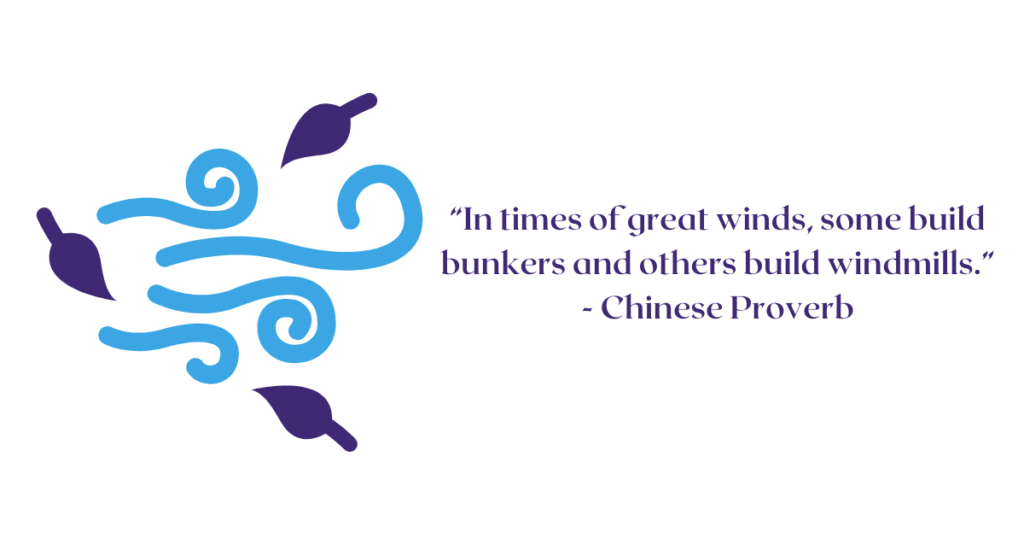
Then there are the excuses we don’t like to say out loud:
- I don’t know how,
- I’m scared,
- It’s too hard,
- I don’t want to.
There’s a Chinese proverb that says, “in times of great winds, some build bunkers and others build windmills.” Bunkers can be good – they provide protection. Windmills, on the other hand, provide opportunity. The question becomes, when you are in the next windstorm, are you going to try to keep the bad – and good – out, or are you going to create an opportunity?
So how will you approach 2022? Are you looking for any improvements? Think Goals rather than resolutions. Have you plans? Start dates? Support?
Let me know if I can be of assistance. 😊
- Sydney Metrick
Avoiding Holiday Overwhelm
Who, what, when, where, why, how. I bet you’ve heard this list before. Maybe it was about news reporting or project management. As it happens, these are the questions to consider when making the decisions that will help you avoid holiday overwhelm.
Let’s review them.
-

If this is how the holidays make you feel, maybe it is time to think about how you approach the holidays. Who do you want to, or really have to, spend time with this holiday season?
- What would be the possible occasions for the get-togethers or gatherings?
- When, if not an actual holiday dinner, would be most feasible and even enjoyable to connect with this person or these people?
- Where would the get-together take place? Is travel necessary? Must you be the host with all the required work?
- Why are you either planning or being talked into doing this? What’s the big picture? Is it about spending time with friends or family? Is this what makes the most sense for you as the year draws to a close?
- How will you make sure you have prioritized the most important get-togethers? And how can you set boundaries around how much energy you expend in planning, participating, and possibly recovering?
Even people we love can cause stress this time of year. To get the most out of your visits, make sure to maintain the boundaries you put in place to keep yourself happy through this “joyous” season.
The “who” of the holidays is stressful enough. However, if you plan on giving gifts, I suggest you walk through that too.
As your Facebook feed will probably suggest at some point, there is no need to go broke or crazy because of the holidays.
-Sydney Metrick
It's Not You, It's Your Brain
Does the number of thoughts, tasks, and commitments in your life feel overwhelming at times? Even when you know what to do first, do you wonder what to do first?
Do you sometimes worry that you forgot to do something, or how to do the something you remembered?
Have you had trouble meeting deadlines?
Are you sometimes concerned that what you’ve done isn’t good enough or even actually done?
 Are your first thoughts about a project more likely the “worse-case scenario” than “yeah, I’ve got this.”
Are your first thoughts about a project more likely the “worse-case scenario” than “yeah, I’ve got this.”
If your answer to any of these questions is yes, you likely have worries. All these demands and your thoughts about them can lead to anxiety. Now for those of you with ADHD, anxiety is likely to be present along with your other symptoms. You might feel stressed more easily, have sleep issues, find it difficult to get things done, and even find your self-esteem is impacted.
Worry anxiety on top of ADHD anxiety is no fun.
The not so good news is that anxiety can be disabling. The better news is two-fold. First, when things feel overwhelming, you can break projects and tasks down into small steps and use the steps to design your day (get help if you can’t seem to do it yourself). Second, it is OK to let go of “should,” perfection, and comparisons to others; better than OK, it’s healthy.
Just keep in mind, it’s not you, it’s your brain. The anxiety may be due to the difference in function of two neurotransmitters, dopamine and norepinephrine. Awareness and developing tricks, tools, and habits can reduce anxiety.
- Sydney Metrick
What Not to Expect
Does this ever happen to you? You compare your work, or your looks, or your accomplishments to someone else’s and feel they are in a “better” place than you are?
There are two problems inherent in this kind of thinking. One is that since you are unique you have your own path to travel. Where your path has many curves, whoever you compare yourself to may be in a straight segment of theirs. Someday the opposite may be true.
The other related problem is having expectations. These typically have the word “should” involved. For example, thinking you should be able to maintain a schedule, or you should be able to estimate how long a task will take, or you should have remembered a task or appointment you’d committed to.
 I’m not a fan of should. When you think shouldn’t have done something you criticize yourself. When you think you should, but aren’t likely to, you’re putting pressure on yourself. It’s a guilt word. In the first case, if you didn’t do something you’d planned to do, look at why and what the solution might be. In the second case, either A) do what you intend, or B) realize you aren’t going to do it and that’s okay for the time being.
I’m not a fan of should. When you think shouldn’t have done something you criticize yourself. When you think you should, but aren’t likely to, you’re putting pressure on yourself. It’s a guilt word. In the first case, if you didn’t do something you’d planned to do, look at why and what the solution might be. In the second case, either A) do what you intend, or B) realize you aren’t going to do it and that’s okay for the time being.
Expectations lead to disappointment. If, by chance, you have ADHD you are likely to have problems with executive functions such as sustaining attention, planning, organizing, remembering details, managing time, or staying on task.
It might take you longer to start and longer to finish a task or project. You might get distracted by things outside or by your own thoughts. As a result, you might often feel overwhelmed which can lead to anxiety or depression.
So, if you do have an attention difference, take the time to find your own style and get comfortable with it. You will be more productive in the long run. Expecting that you’ll be like anyone else, well…
Finding your own style is important. Imagine how much easier life would be if you know how to manage your schedule, estimate the time a task will take, and remember your appointments. Helping people do this is what puts the heart into coaching.
-Sydney Metrick
If Not Now, When?
Are you familiar with Dr. Seuss’s, “The waiting place?”
“Waiting for a train to go or a bus to come, or a plane to go or the mail to come,
Or the snow to snow or waiting for a Yes or a No, or waiting for their hair to grow.
Everyone is just waiting.”
Are you waiting for the time to be “right” to start a task or a project, especially a big project or a less than exciting task? The truth is when a project feels too big to know where to start, or a task is tedious, the time will only be right when you actually decide to start.
There are many reasons for procrastination and only one solution.
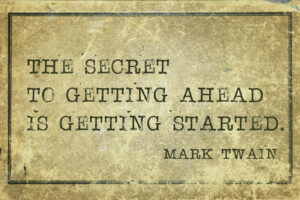 Starting.
Starting.
Fear not. Starting is not the same as finishing, and knowing the best place to start is not necessary. Starting just means taking one small step…then another.
Sometimes a project or task can be easier with chunking. That means breaking it into either time chunks, e.g. “I will spend ten minutes on this,” or chunks of items or work. For example, just go through one pile, or writing one page.
If “now” really isn’t the ideal time to start, then schedule a “now” and stick to it!
You may be familiar with the Chinese proverb that says: “The best time to plant a tree was 20 years ago. The second-best time is now.” So, forget about waiting.
-Sydney Metrick
Commitment or Over-Commitment?
Thinking about this month’s newsletter while standing in front of our stuffed closet looking for a jacket, the idea of over-commitment came to mind. While interesting things might cause overflowing closets, drawers, counters, and desks (just to name a few), interesting opportunities can lead to overcrowding your schedule.
 How do you decide if something that’s interesting is necessary? And, if an opportunity or thing actually is necessary and you want to commit to doing it or having it, will there be room in your schedule or space in your home or office?
How do you decide if something that’s interesting is necessary? And, if an opportunity or thing actually is necessary and you want to commit to doing it or having it, will there be room in your schedule or space in your home or office?
My colleague, Dana Arkinzadeh of DMA Organizing uses the principle of container as limiter. When you realize you only have a limited amount of time in a day and a limited amount of space in your home or office, you see the importance of setting limits based on what commitments you want to make for your calendar or physical space.
Here’s the thing, if you do not set limits or prioritize you can find yourself surrounded by things that mean nothing to you and no time for the activities and people that are important to you.
When faced with something you want or want to do, ask yourself:
Questions for things
- Do you already have it?
- If so, does it still function?
- Do you have space for a new, similar thing?
- Will you actually use it?
Questions for appointments
- Do you have to go?
- Do you want to go?
- How much time can you allot?
- Are you stealing time from something more important?
- Sydney Metrick
Are You Sleeping?
Does this ever happen to you? You go to bed at a reasonable hour and you’re pretty tired, but all you do is toss and turn. Sleep eludes you. It might be that you can’t shut down because your mind is churning out endless thoughts.
Or maybe you do fall asleep but wake in the middle of the night and just can’t get back to sleep.
Issues with falling and staying asleep are especially common in people with ADHD. When you finally do fall asleep you may find it hard to wake up.
There are a number of causes, but solutions are also available.
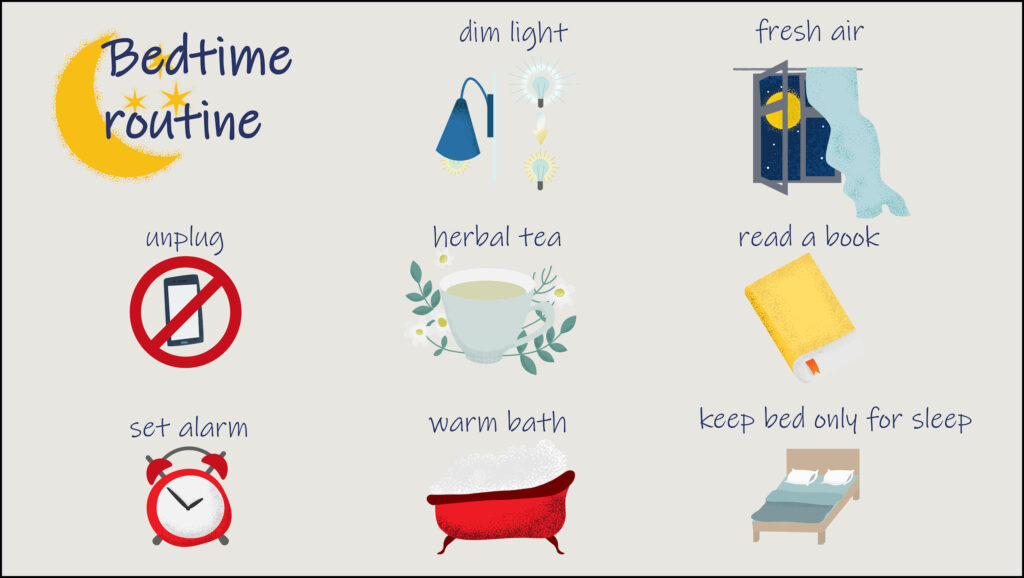 An erratic sleep schedule or no sleep schedule at all is one area that can contribute to poor sleep. Developing a consistent bedtime routine can train your brain and body to get tired at a particular time. If you’re more alert in the evening and often stay up until the wee hours, you might work on gradually moving back your bedtime, perhaps half an hour each week until you find a time that feels right for you.
An erratic sleep schedule or no sleep schedule at all is one area that can contribute to poor sleep. Developing a consistent bedtime routine can train your brain and body to get tired at a particular time. If you’re more alert in the evening and often stay up until the wee hours, you might work on gradually moving back your bedtime, perhaps half an hour each week until you find a time that feels right for you.
Deciding how many hours of sleep you want/need will help. If your body says seven hours and you stay up until 3, getting your day started might put you out of sync with work or family.
Let’s say you decide you want to go to bed by 11:30 every night. Start winding down at 11. This means preparing your room for sleeping, doing your bedtime routine whatever that may be, and turning off your computer, phone, and television.
It takes a while to accommodate this type of change so be prepared to make small adjustments.
You can improve sleep by paying attention to what you eat and drink and when. Some herb teas are soothing and relaxing. It’s also good to avoid large meals and alcoholic beverages for at least three hours before going to bed.
Finally, make sure your room and bed are comfortable and quiet. Here in Mexico, all-night parties, barking dogs, and cohetes - the rockets that accompany the many celebrations are all sleep interrupters. Earplugs and white noise machines can moderate outside noise.
The Problem with Perfect
The law of diminishing returns states that at a certain point adding more effort will actually decrease output.
So how do you know how far to go on a project before deciding that it’s “good enough?” When is good enough “good enough?”
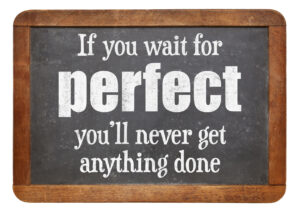 Perhaps good enough is what is done within a specified time frame, or by a particular date. There’s another law known as Parkinson’s law that says, “work expands to fill the time available for its completion.”
Perhaps good enough is what is done within a specified time frame, or by a particular date. There’s another law known as Parkinson’s law that says, “work expands to fill the time available for its completion.”
(Actually, the same law applies to stuff. An example is the limited parking and tiny garages in San Francisco. The garages have just enough room for a car and those who have a garage, park in it. In the suburbs where there may be two- or three-car garages, you might find the car in the driveway as the garage holds a ping pong table, bicycles, washing machine, and more.)
Perfect is difficult to define. One person’s perfect is another’s so-so, or even eh. Voltaire said, “perfect is the enemy of good”; what are you sacrificing when you give up being satisfied with good? And what is the cost to span the gap from good to perfect? I’m willing to bet that the difference in quality is not worth the price to your wallet and/or peace of mind.
If you’re currently working towards “good” perhaps I can help. Feel free to reach out.
-Sydney Metrick
On a Scale of One to Ten
Effective time management is based on several things. One of these is prioritizing.
When you are at a decision point—deciding whether to do something—a good question is “on a scale of one to ten how important is this right now?” Due to the impulsivity those of you with ADHD experience, right now seems ideal for whatever has caught your attention. That is until later when you realize something really important got forgotten or pushed back.
When you invest time in a lower priority, but maybe really interesting action, you’re withdrawing time from something that maybe had a closer due date, or start date, or commitment.
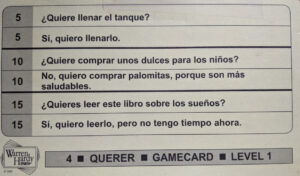 For example: I’ve been studying Spanish for quite a while. I have numerous means for learning which include flash cards and short video lessons. I see the flash cards in my peripheral vision as I type, but I can also see my Kindle which holds the interesting story I’m in the middle of reading. It’s easy for me to tell myself I put in my study time by reading a letter in Spanish without using Google translate. But that’s really an excuse. Spanish is necessary for me to communicate with the Mexican friends, neighbors, and business people I encounter daily. Reading a novel…well.
For example: I’ve been studying Spanish for quite a while. I have numerous means for learning which include flash cards and short video lessons. I see the flash cards in my peripheral vision as I type, but I can also see my Kindle which holds the interesting story I’m in the middle of reading. It’s easy for me to tell myself I put in my study time by reading a letter in Spanish without using Google translate. But that’s really an excuse. Spanish is necessary for me to communicate with the Mexican friends, neighbors, and business people I encounter daily. Reading a novel…well.
The two things that work best for me involving other people. I speak Spanish with whoever has the patience to listen, and often get small corrections. Most important is the Spanish class I have every Sunday at 1 p.m. Showing up for others seems to be easier than showing up for oneself.
When Less is More
Or what does clutter cost you?
Last winter a friend here in Mexico flew back to the U.S. to help an ailing family member move from his home of many years to an assisted living facility. Over the course of three months, the two of them went through the ordeal of clearing shelves, closets, cupboards, and boxes.
Whether or not a move is in your future, waiting until the “last minute” to delve into what you’ve accumulated over the years creates overwhelm and stress.
Decide to decide.

Consider the Toss or Keep method: have I used this is the past year? Is it serving a specific purpose? Do I have a place to keep it where I can find it again? Any no's – toss it. If this disappeared from your life tomorrow, how would it impact you?
To begin: the first practical step in clearing clutter is sorting. Do I use this, what category of item is it, etc. Identify and categorize things. Do what’s visible first so you see results. Group similar items into broad categories. If you know you want to keep an item but have no idea where it should go ask, “Who are its friends?”
Examples of friend groups:
- Toothbrush, toothpaste, floss, water glass
- Sunglasses, keys, wallet or purse
- Pen cup, tape, scissors, stapler
- Foil, plastic wrap, sandwich bags

Once you have your groups, you then want to find realistic and memorable “homes” for them. This means deciding on places where you will put things away and remember where these places are.
What about all the things that are left? The second practical step is purging.
This means you get to give away, throw away, or donate unneeded items. Decide when you can and will do this and if you need help. It will be more difficult the longer you postpone doing this so…
-Sydney Metrick
When Later Never Arrives
Does this ever happen to you? Maybe you drop a sock out of your basket of clean laundry as you’re taking the basket to the bedroom and you think, “I’ll get that later.” Or perhaps you put a dish in the sink and tell yourself you’ll wash it later. It could be you apply later to paying a bill, returning a phone call, or filing papers.
The question in many of these examples is, what would make it easier later? (Other than not having your hands full with the laundry basket.)
I used to teach a class called “Getting Organized for Non-Linear Thinkers.” Some of you may have taken the class. To exemplify the “later” problem, I’d drop a pen and say, “I’ll pick that up later.” As it would take almost no time to bend over and pick it up right then, and I certainly had no plans to be sitting on the floor closer to the pen in the future, the question becomes: When would later actually be?
 The problem with “later” is that it has no real meaning. It can be after you put down the laundry, 30 minutes before the deadline, or never. So, at those decision points ask yourself, “is later really the better choice?” It could be. You have constraints on your time and resources, not everything can be done right now.
The problem with “later” is that it has no real meaning. It can be after you put down the laundry, 30 minutes before the deadline, or never. So, at those decision points ask yourself, “is later really the better choice?” It could be. You have constraints on your time and resources, not everything can be done right now.
However, if later is better, schedule the task to define when later will actually arrive.
-Sydney Metrick
And the address is…?
If I invited you to my house and only gave you the name of the town, is it likely you’d ever find me? Having the neighborhood would give you a slightly better chance, but only with the street name and the house number could you pinpoint the exact location.
 Let’s substitute my house for yours. Consider some of the important things you misplace with regularity: for example, your keys, or shoes, or important papers. You know these items are in the house somewhere, but which somewhere? Maybe your papers are in some pile or stuffed in a box; or your keys are on the table or counter or in a jacket pocket. Perhaps you kicked off your shoes at the door, or they might be under the couch, or the pair you want is in that pile of random family shoes.
Let’s substitute my house for yours. Consider some of the important things you misplace with regularity: for example, your keys, or shoes, or important papers. You know these items are in the house somewhere, but which somewhere? Maybe your papers are in some pile or stuffed in a box; or your keys are on the table or counter or in a jacket pocket. Perhaps you kicked off your shoes at the door, or they might be under the couch, or the pair you want is in that pile of random family shoes.
This can be worse for something important that you use irregularly – like the extra key to your parents’ garage.
These items are lacking a home of their own. Determining places for important things to “live,” remembering the “address,” and developing the habit of putting important things into their homes when you finish using them will save you time and stress. Imagine always knowing where your keys are!
I live with a somewhat disorganized person. To make this process easier for him, I created labels for his drawers and bins for certain types of items. Having them is one part of a process that works for him. What would work for you?
Need help? Here I am.
-Sydney Metrick




